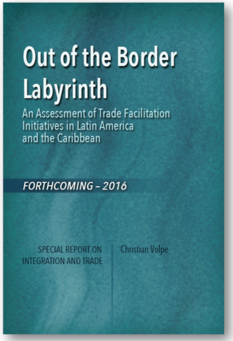
Special Report prepared by the Integration and Trade Sector
Publication date: Fall 2016
Author/Editor: Christian Volpe Martincus
Contributors:
Language: English
Abstract
Real borders can be thick. They are not dimensionless lines as typically assumed in theoretical models and standard empirical analyses, but a zone populated by agencies that develop and administer regulations firms have to comply with when engaging in international trade, many of which have their own procedures. Borders can then easily become a labyrinth hard to get through. This is crucial because border agencies’ procedures influence the time needed to ship goods from their origins to their destinations and can thereby affect trade, particularly in a context characterized by increasingly segmented production chains and rising lean retailing.
Latin American and Caribbean countries have recently implemented various trade facilitation initiatives that aim to streamline the administrative processing of trade flows and accordingly reduce trading times. These initiatives include risk management, single windows, authorized economic operators, simplified postal exports, and expedited transit arrangements, all of which are cornerstones of the 2013 WTO Agreement on Trade Facilitation and have been subject of multiple international organizations’ operations. Despite of being ubiquitous, evidence on the impact of these specific initiatives has been extremely limited.
Lack of precise data has been a major obstacle. Out of the Border Labyrinth fills this gap and sheds entirely new light on the trade effects of such trade facilitation measures and the channels thereof. It presents the results of thorough impact evaluations, which have been carried out by applying rigorous methods on unprecedented transaction-level data for several countries in the region. These results reveal that trade actually expanded as a consequence of such facilitation measures and that the primary channel has been shipping frequency. Based on these econometric examinations and careful institutional case studies, Out of the Border Labyrinth systematizes a new line of trade policy research and informs policymaking and assistance activities by international organizations by providing tools that will help design and assess policies in an area that will be very active in upcoming years as countries work towards implementing the multilateral agreement reached in Bali.
Background Working Papers
